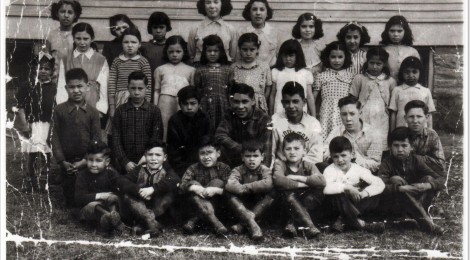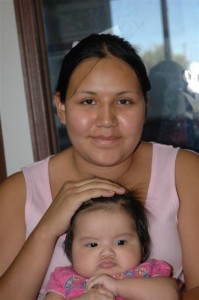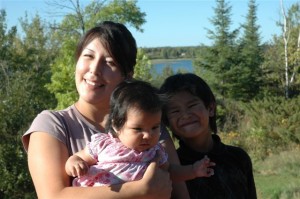
Promoting Attachment Security in First Nations Communities
Last March, the Trauma and Attachment Report published “Early Attachment: Leaving its Mark Across the Lifespan” (March 11, 2011), which discussed the detrimental effects insecure attachment can have throughout one’s life.
In a recent initiative, Save the Children Canada partnered with psychiatrist Jean Wittenberg of Sick Kids Hospital in Toronto, to develop Supporting Security: Strengthening the Experience of Security for First Nation Mothers and their Infants. This project works in First Nations communities with caregivers and their infants to age one year, with the goal of improving the parent-child bonding experience. The First Nations population is growing at nearly twice the national rate, and they are one of the most commonly marginalized groups in Canada, struggling with issues such as poverty, depression, suicide, and violence in a number of their communities.
Save the Children’s Supporting Security program, along with the support of the community leaders, works to address these issues by understanding their roots. According to Cicely McWilliam, a Senior Advisor at Save the Children, “This program is attempting to remedy a problem caused by previous policies, namely the residential school system. The very nature of taking particularly young children away from family and community has, from generation to generation, weakened the family structure.”
We had a chance to speak with Dr. Wittenberg to get more insight on the program, what it involves, and what it hopes to accomplish.
Q: What are some of the issues the communities you are working with face and how can this program help?
A: The problems that these First Nations communities face, poverty in particular, are partly a legacy of being taken away from their families and partly a legacy of having their culture disrupted. This leads to a lot of unfortunate and sometimes threatening situations occurring in these communities. Almost all the people in the groups we work with have one or both parents who have attended a residential school. When you have experienced serious trauma in your life, it changes how you react to other people and that can get passed on for generations. In the program, we help educate caregivers on how their reactions affect their children, and we teach them the skills and techniques they need to help their children feel secure.
Q: What is involved in this program, what specific skills and techniques are you teaching parents to promote security and parent-child bonding?
A: First, we educate caregivers on how to recognize the signs of distress in their infants and in themselves. Also, we teach about emotional and cognitive development, so they can understand how their children think and react. We then actually practice with them how to observe infants and infants’ reactions. And we teach them to think about the reactions they have to their own children and how their reactions affect their own children. We teach them about things that make infants insecure, about how infants react to parents who are angry or violent and how this affects development. We also teach them problem solving techniques to help them stay organized when they are distressed. This is likely to reduce their distress, making them more able to help their infants feel secure.
Q: You mentioned before that some of the issues these communities face are due to a disruption of culture. How important is culture to healthy development?
A: There is evidence that children who have a strong cultural identity are more likely to have better psychological health. Chiefs in the Kenora area communities have approached me and asked me to work with community elders with the goal of developing programs that integrate mental health interventions with programs that work to strengthen cultural identity and pride for First Nations children. Supporting Security is a preventive intervention. We are thinking about bringing parents together into a cultural experience, while helping them strengthen security and parent-child bonding, and instilling a sense of cultural pride in parents and their children.
Supporting Security has been running in only a small number of communities for less than two years. Although the research is still in progress, Wittenberg considers outcomes to be promising.
You can learn more about Save the Children Canada and the work they do domestically and internationally by visiting www.savethechildren.ca.
-Amanda Sharples, Contributing Writer





